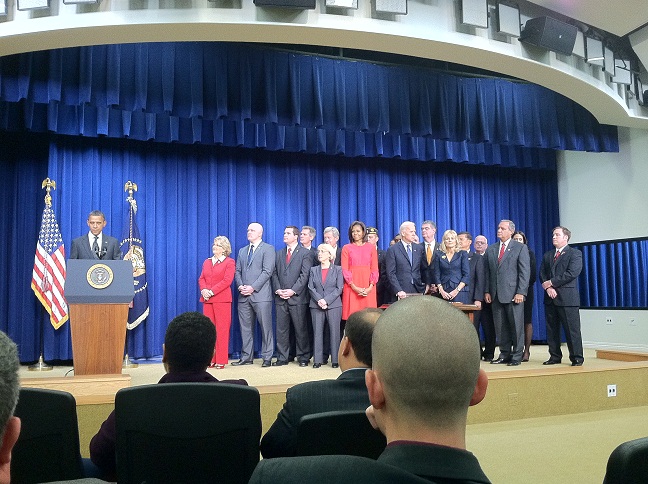 VetsFirst was there when President Obama signed The VOW to Hire Heroes Act. Perhaps because it was signed into law just three days before Thanksgiving might explain why its adoption didn’t receive the publicity it truly deserved.
VetsFirst was there when President Obama signed The VOW to Hire Heroes Act. Perhaps because it was signed into law just three days before Thanksgiving might explain why its adoption didn’t receive the publicity it truly deserved.
Check out these numbers while remembering that numbers don’t lie. Today, a whopping 900,000 veterans are unemployed. In October, the U.S. Department of Labor reported that the average unemployment rate among all veterans is 7.7 percent, but it is a staggering 12.1 percent for Iraq and Afghanistan veterans. Sadly, vets between the ages of 35 and 64, who by the way have the fewest available VA education and training options left, constitute nearly two-thirds of all unemployed veterans.
What do these numbers tell you? I’m no Einstein but they tell me that unemployment among veterans is not just a problem for Iraq and Afghanistan veterans, but for some vets who served near the end of the Vietnam War period, the peacetime period after May 7, 1975, and the beginning of the Persian Gulf War period on August 2, 1990, and forward beyond that point.
So, I’m thinking that a lot of our unemployed veterans who served their nation well and with honor are being forced to take steps like selling their homes, probably at a time when said homes are undervalued, and moving their families into Mom and Dad’s house or an apartment; or worse, having to take funds out of their retirement accounts now to support themselves and their families, and left looking straight in the eyes at an impoverished future.
To this writer, these circumstances constitute a national disgrace. Is this the way the United States treats those who mostly volunteered to serve their country? I hope not.
Believing that I’m a positive-thinking individual, and from what I’ve learned about the details of The VOW To Hire Heroes Act, maybe our country can turn around this high level of veterans unemployment. The law contains business tax credits that are highest for service-related disabled vets who have been unemployed for longer than six months, but it also includes a business tax credit of lesser value for veterans unemployed longer than six months, and a third tax credit of even lesser value for businesses who hire a vet who is out of work for longer than four weeks.
Even better, this law provides disabled veterans who have exhausted their unemployment benefits with an additional one (1) year of VA Vocational Rehabilitation and Education benefits. And, for nearly 100,000 unemployed vets of past eras and wars, the law gives an additional one (1) year of Montgomery G. I. Bill benefits to qualify for jobs in high-demand fields, from trucking to technology. These two provisions alone could really help currently under-qualified vets to be successful in today’s job market.
Other important provisions of The VOW To Hire Heroes Act include making the military’s Transition Assistance Program (TAP) mandatory for most service members re-entering civilian life, and a requirement that the U.S. Department of Labor take a thorough look at how military skills can transfer to civilian jobs, and how the DOL can make it easier for our newest veterans to obtain the licenses/certifications to compete for such jobs.
From someone who worked for a total of 43 years, and who understands how work improved the quality of my life and my self-esteem, let’s pray that The VOW To Hire Heroes Act really works well.
Terry Moakley
Chair of the VetsFirst Committee
